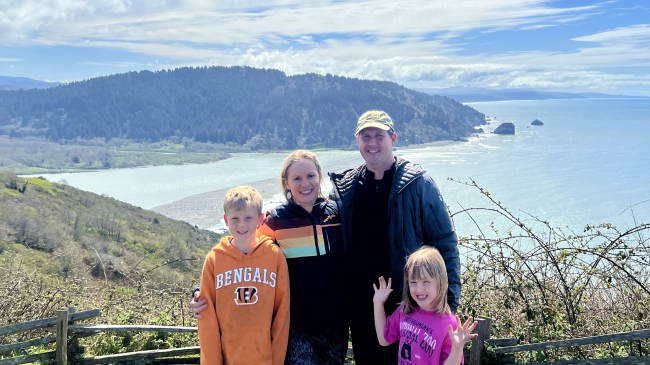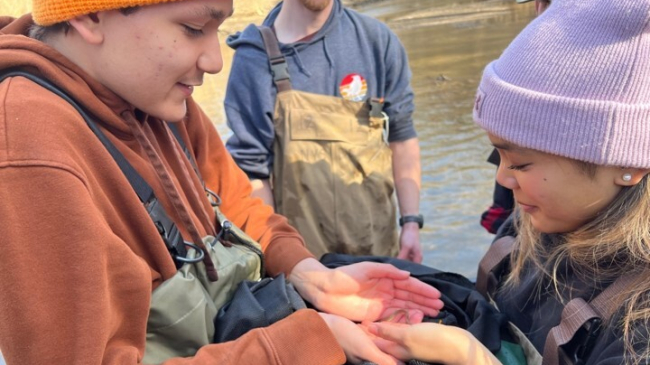
(Image credit: NOAA LMRCSC)
Dr. Paulinus Chigbu, Director of the NOAA Living Marine Resources Cooperative Science Center located at the University of Maryland Eastern Shore offsite link (UMES), has been appointment to the National Sea Grant Advisory Board. "I am honored to be appointed to serve on the National Sea Grant Advisory Board, to have the opportunity to provide advice on, among other things, the designation of sea grant colleges and institutes and to give guidance on the research and educational initiatives of the Sea Grant College Program" said Chigbu, in his response to an invitation from former NOAA Administrator, Dr. Jane Lubchenco to serve as a member of the Board.
Dr. Chigbu has a long established relationship with NOAA. He served as the Project Director of the NOAA-NESDIS Environmental Risks Assessment Integrative Systems Approach (ERAISA) Project, while at Jackson State University, MS, and was a member of the Governing Board established in 1999 to develop an education program to increase the training and graduation rates of individuals from underrepresented communities in marine and atmospheric sciences. The recommendation of this Governing Board served as a foundation upon which the Educational Partnership Program with Minority Serving Institutions was built.
Paulinus brings a strong academic and research background to his position as LMRCSC Director. He received his Ph.D. in Fisheries from the University of Washington and was the recipient of a Fulbright Scholarship. He currently serves as the UMES Director of the NSF Center for Research Excellence in Science and Technology (CREST) and is actively engaged in the work of the Center for the Study of Coastal Ecosystem Processes and Dynamics in the Mid-Atlantic Region at the Paul S. Sarbanes Coastal Ecology Center (PSSCEC), University of Maryland Eastern Shore. In addition, Dr. Chigbu is the Technical Advisor to the Advisory Committee to the United States National Section, International Committee for the Conservation of Atlantic Tunas (ICCAT); serves as Director of the Research Experiences for Undergraduates (REU) Program in marine and estuarine sciences at UMES; and, is a member, Council of Fellows, Cooperative Institute for the North Atlantic Region (CINAR), based at Woods Hole Oceanographic Institute.
The NOAA Living Marine Resources Cooperative Science Center (LMRCSC) was established through a cooperative agreement between NOAA and the University of Maryland Eastern Shore (lead institution). The Center is a consortium of academic institutions comprised of Delaware State University, Hampton University, Savannah State University, the University of Miami, Rosenstiel School of Marine and Atmospheric Sciences, the University of Maryland Center for Environmental Science Institute of Marine and Environmental Technology and Oregon State University. The mission of the Center is “To develop exemplary academic and research collaborations that prepare a diverse student body for careers in marine and fisheries sciences”. The Center’s major Education Goals are to: (1) prepare the future workforce in marine and fisheries sciences, and (2) strengthen collaborations across universities to enhance academic programs in marine and fisheries sciences, and its Research Goal is to: (3) develop an exemplary capacity for scientific collaborations among partner institutions in the fields of marine and fisheries sciences.
Some significant accomplishments of the LMRCSC are the establishment of a Professional Science Master’s degree program in Quantitative Fisheries and Resource Economics in 2010; the Center has graduated 382 students (286 B.S./B.A., 83 M.S./M.A. and 13 Ph.D.) in NOAA core science areas, and 149 students (62 graduates, 87 undergraduates) are currently supported through EPP; 55 students have participated in the open ocean fisheries research through the annual LMRCSC winter cruises in the northwest Atlantic shelf of the United States; LMRCSC has supported more than 81 research projects in four thematic areas: quantitative fisheries, essential fish habitat, fisheries economics and aquaculture, developed in collaboration with NOAA scientists.
Research at the Center has resulted in more than 618 presentations at scientific meetings and 210 peer-reviewed articles and book chapters. More than 85 students have interned at NOAA laboratories, and more than 15 LMRCSC graduates have been employed by NOAA and other Federal agencies. For more information on the NOAA Living Marine Resources Cooperative Science Center, visit



